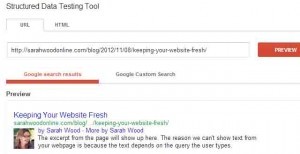If like me you have read so many 2013 predictions (And here is one from Social Media Examiner as an example – Social Media Predictions 2013), Google+ is an essential element in all of them. If you have tried Google+ and don’t quite get it, don’t be too quick to dismiss it as the only direction it is moving in is up.
 With the introduction of communities to make it easier for like-minded people to share content, the addition of business pages, and the introduction of Google authorship, Google is moving Google+ to the centre of your online positioning, whether you might like it or not.
With the introduction of communities to make it easier for like-minded people to share content, the addition of business pages, and the introduction of Google authorship, Google is moving Google+ to the centre of your online positioning, whether you might like it or not.
Even if your friends aren’t active on the platform, the benefits from appearing higher in search engine listings is high, and being active on Google+ will enhance your visibility across the internets.
One specific action you can take now is to claim Google authorship for your online content.
As Google continues to work hard on maintaining its dominance and relevance this year, it will be making more of authorship in the near future, and if you act now you should see an increase in credibility and consistency for your online content.
Setting up authorship means that your content is claimed as your own where it appears online, and when your content is returned in a search result it is accompanied by your profile shot from Google+ – adding credibility and creating recognition for your results and making searchers more likely to click on your content. Some studies have indicated huge increases to click-through rates, which follows in a world where we continually respond more to visual stimulants than just text alone.
If you are logged into Google+ and searching on Google, content shared by people in your Google+ circles will be shown with their profile picture attached. So Google assumes you trust these people or will be interested in their content over others’ that you don’t know, and that you will be more likely to find it of use.
This will continue to build, adding your own authority as an author to the authority of the sites your content appears on, and at the very least improving the way your listings appear on search returns.
There are four simple steps to the process, so claim your Google authorship now:
- Make sure you have your Google+ profile set up. Set up a Google+ account here if you don’t already have one.
- Link your Google+ profile to your website or blog – use the about page, and include the rel=author tag in your link.
- Add a reciprocal link to your Google+ profile from your about page.
- Verify your email address with Google+
Once you have done this, you can check if it works using Google’s Structured Data Testing Tool:

Test your authorship works using Google’s structured data tool.
Get started with Google’s instructions.
For a more in-depth review, I found this article from state of search on Google authorship’s importance very useful.
I hope 2013 is proving a good year for you already; I am off to a slow start due to some small family issues taking my attention, but have resolved to become much better organised and more productive this year – how about you?
I would love to hear from you in the comments below, and please contact me if you would like help with driving your own online success in the coming year.
thanks, work great for me, claim authorship is very important for blogger
Thanks for your comment; glad this is working for you, this will be a growing part of Google’s strategy going forward, so it’s good to get it sorted now.